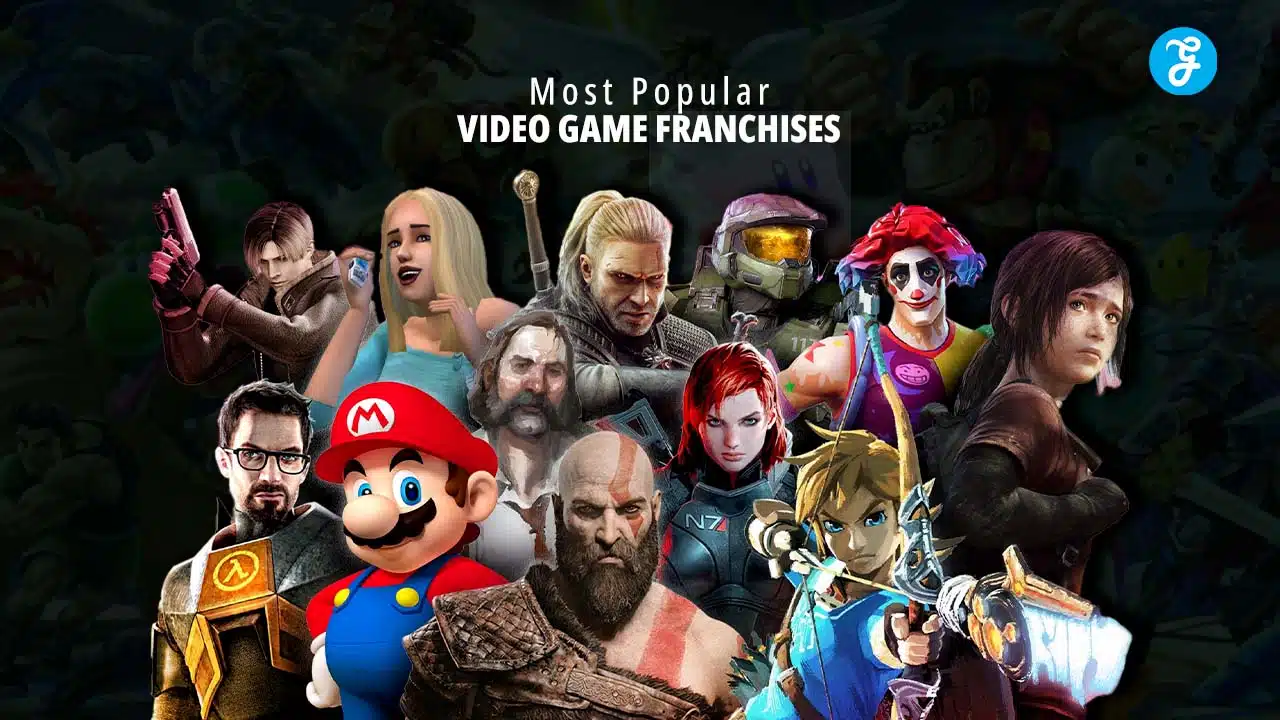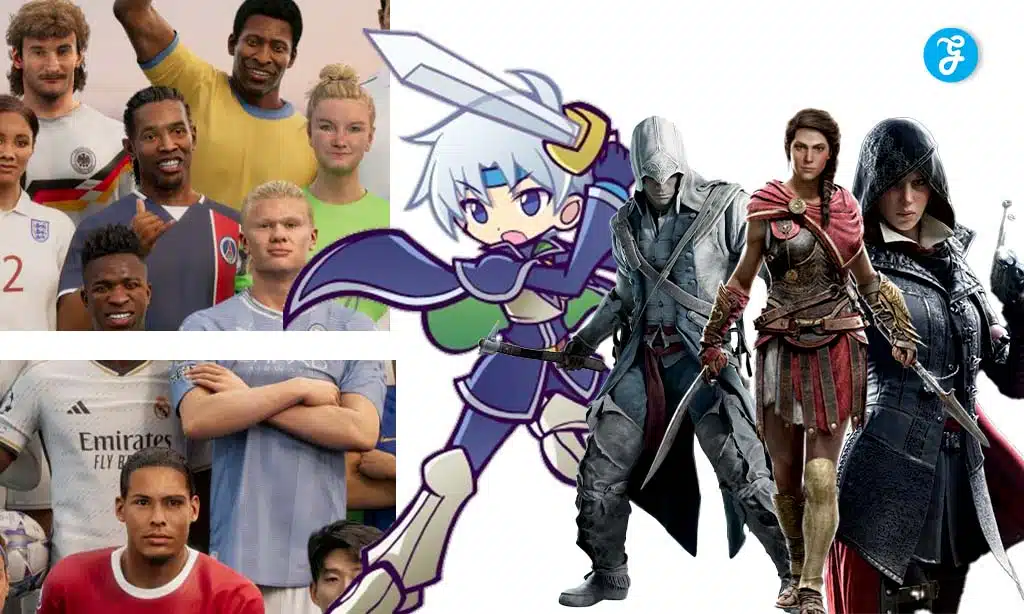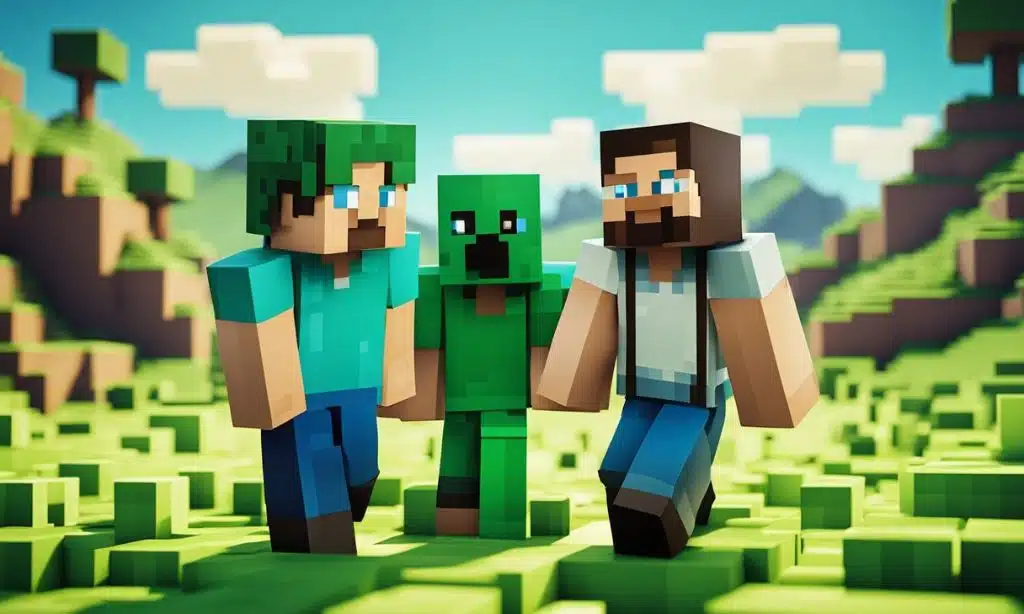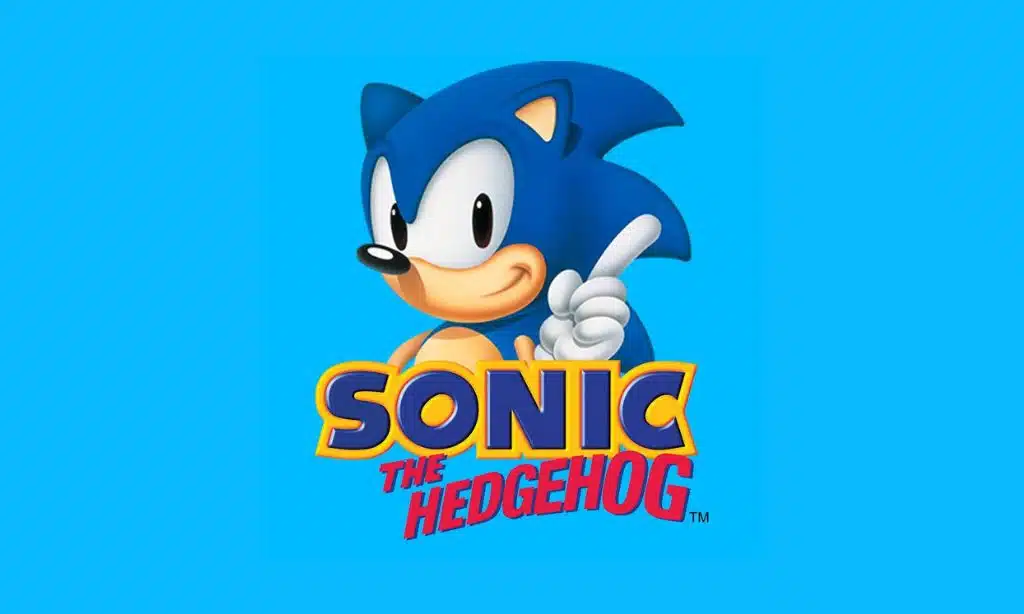From pixelated plumbers to sprawling open worlds, video games have come a long way since their inception. These digital playgrounds have not only entertained us but have also shaped pop culture, pushed technological boundaries, and created communities spanning the globe. In this journey through gaming history, we’ll explore 18 legendary franchises that have left an indelible mark on the industry. These aren’t just games; they’re cultural phenomena that have sparked imaginations, fostered friendships, and even influenced how we tell stories across all media. Whether you’re a seasoned gamer or a curious newcomer, join us as we dive into the worlds that have captivated millions and continue to evolve with each passing year.
The Most Popular Video Game Franchises
Dive into the world of gaming legends as we explore the 18 most popular video game franchises that have shaped the industry. From Super Mario and Pokémon to Grand Theft Auto and Call of Duty, these iconic series have sold millions of copies worldwide. Discover the evolution of beloved characters, groundbreaking gameplay innovations, and the cultural impact of these gaming titans. Whether you’re a fan of RPGs, action-adventures, or first-person shooters, join us on this journey through the greatest names in video game history with The Most Popular Video Game Franchises.
1. Super Mario
Super Mario, the mustachioed plumber in a red cap, is Nintendo’s iconic mascot and the star of gaming’s most recognizable franchise. Since his debut in 1985’s “Super Mario Bros.,” Mario has appeared in over 200 games across various genres. From classic 2D side-scrollers to innovative 3D adventures, the series has consistently redefined platforming games. Known for its colorful worlds, creative power-ups, and family-friendly gameplay, Super Mario has sold over 680 million copies worldwide. The franchise’s influence extends beyond games into movies, TV shows, and merchandise, cementing Mario’s status as a pop culture icon.
Key Features:
- Iconic characters: Mario, Luigi, Princess Peach, Bowser
- Power-ups: Mushrooms, Fire Flowers, Star Power
- Varied gameplay: 2D platforming, 3D exploration, kart racing
- Colorful, whimsical worlds
- Family-friendly content
- Innovative level design
2. Pokémon
Pokémon, short for “Pocket Monsters,” is a global phenomenon that began in 1996 with the release of “Pokémon Red and Green” in Japan. This RPG series, created by Satoshi Tajiri, revolves around catching, training, and battling creatures called Pokémon. With over 1,000 unique Pokémon species across nine generations, the franchise has sold more than 440 million game copies worldwide. Pokémon’s success spans beyond video games, encompassing a long-running anime series, movies, trading cards, and a vast array of merchandise. The series’ blend of collection, strategy, and adventure continues to captivate fans of all ages.
Key Features:
- Catch, train, and battle Pokémon
- Turn-based RPG combat system
- Over 1,000 unique Pokémon species
- Evolving creatures
- Multiplayer trading and battling
- Regular new generations with new Pokémon and regions
3. Call of Duty
Call of Duty, launched in 2003, has become synonymous with the first-person shooter genre. This military-themed series is known for its intense multiplayer action, cinematic single-player campaigns, and annual releases. Set across various historical, modern, and futuristic warfare scenarios, Call of Duty has sold over 425 million copies worldwide. The franchise’s success is driven by its cutting-edge graphics, robust multiplayer modes, and e-sports presence. With its fast-paced gameplay and realistic combat simulations, Call of Duty continues to be a dominant force in the gaming industry, consistently breaking sales records with each new release.
Key Features:
- First-person shooter gameplay
- Multiplayer focus with various game modes
- Annual releases with new settings and storylines
- Cinematic single-player campaigns
- Realistic weapons and military scenarios
- Zombies mode in many installments
4. Grand Theft Auto (GTA)
Grand Theft Auto, created by Rockstar Games, is an open-world action-adventure series that has redefined sandbox gameplay. Known for its satirical take on American culture, controversial themes, and unparalleled player freedom, GTA has sold over 380 million copies worldwide. The series allows players to explore vast, detailed cities while engaging in missions, side activities, and often outrageous criminal escapades. GTA V, released in 2013, remains one of the best-selling games of all time, with over 180 million copies sold. The franchise’s impact on gaming and pop culture is immeasurable, influencing countless open-world games that followed.
Key Features:
- Open-world sandbox gameplay
- Satirical storylines and characters
- Variety of vehicles to steal and drive
- Multiple side activities and mini-games
- Online multiplayer mode (GTA Online)
- High level of player freedom and interactivity
5. The Legend of Zelda
The Legend of Zelda, first released in 1986, is a beloved action-adventure series created by Shigeru Miyamoto and Takashi Tezuka. Centered around the hero Link’s quests to save Princess Zelda and the kingdom of Hyrule, the series is renowned for its epic storytelling, intricate puzzles, and expansive worlds. With over 130 million copies sold worldwide, Zelda games have consistently pushed the boundaries of exploration and adventure gaming. From the groundbreaking open world of “Breath of the Wild” to the timeless classic “Ocarina of Time,” the franchise continues to innovate while maintaining its core elements of discovery and heroism.
Key Features:
- Action-adventure gameplay with puzzle-solving
- Iconic characters: Link, Zelda, Ganon
- Varied weapons and tools for exploration
- Epic, fantasy-based storylines
- Mixture of combat, exploration, and puzzle-solving
- Unique art styles across different games
6. FIFA (now EA Sports FC)
FIFA, now rebranded as EA Sports FC, has been the premier soccer simulation series since 1993. Known for its realistic gameplay, official team and player licenses, and annual updates, the franchise has sold over 325 million copies. The series offers various modes including career, Ultimate Team, and online multiplayer, catering to both casual fans and hardcore soccer enthusiasts. FIFA’s impact extends beyond gaming, influencing how fans engage with the sport and even affecting player valuations in the real world. The transition to EA Sports FC marks a new era for the franchise, promising continued innovation in soccer gaming.
Key Features:
- Realistic soccer/football simulation
- Official licenses for teams, players, and leagues
- Ultimate Team mode for building custom squads
- Career mode for long-term team management
- Online multiplayer matches
- Annual updates with improved graphics and gameplay
7. Minecraft
Minecraft, created by Markus “Notch” Persson and released in 2011, is a sandbox game that has become a global phenomenon. With its distinctive blocky graphics and virtually limitless gameplay possibilities, Minecraft has sold over 300 million copies, making it the best-selling video game of all time. The game’s core mechanic of mining resources and crafting items allows players to build, explore, and survive in procedurally generated worlds. Minecraft’s success lies in its universal appeal, fostering creativity, problem-solving, and collaboration among players of all ages. Its impact extends to education, with versions designed specifically for classroom use.
Key Features:
- Open-world sandbox gameplay
- Block-based building and crafting system
- Survival mode with resource gathering and combat
- Creative mode for unlimited building
- Multiplayer servers and community-made mods
- Regular updates with new features and blocks
8. Final Fantasy
Final Fantasy, created by Hironobu Sakaguchi in 1987, is a legendary RPG series known for its epic storylines, memorable characters, and groundbreaking visuals. With over 180 million copies sold worldwide, each main entry in the series introduces a new world and cast, united by common themes and gameplay elements. Final Fantasy has been at the forefront of gaming innovation, from pioneering pre-rendered backgrounds to pushing the boundaries of cinematic storytelling in games. The franchise’s influence extends beyond gaming, with successful spin-off movies, anime series, and a wealth of merchandise, cementing its place in pop culture history.
Key Features:
- Complex, epic storylines in each game
- Turn-based or real-time combat systems
- Unique characters and summonable creatures (like Chocobos)
- Job/class system for character development
- High-quality cinematic cutscenes
- Iconic music compositions
9. Resident Evil
Resident Evil, known as Biohazard in Japan, is a survival horror series that defined and redefined the genre since its debut in 1996. Created by Tokuro Fujiwara and Shinji Mikami, the franchise has sold over 140 million copies worldwide. Known for its tense atmosphere, resource management, and zombie-filled narratives, Resident Evil blends horror, action, and puzzle-solving elements. The series has successfully reinvented itself multiple times, from the fixed camera angles of early games to over-the-shoulder and first-person perspectives in recent entries. Its impact extends to movies, animated films, and novels, making it a cornerstone of horror entertainment.
Key Features:
- Survival horror gameplay with limited resources
- Zombie and bio-organic weapon enemies
- Puzzle-solving elements
- Inventory management
- Mix of action and horror elements
- Varied camera perspectives across the series
10. Metal Gear
Metal Gear, created by Hideo Kojima, is a stealth-action series that began in 1987 and has sold over 60 million copies worldwide. Known for its complex storylines blending political intrigue and science fiction, the series follows the adventures of various special forces operatives, most notably Solid Snake. Metal Gear pioneered the stealth genre, emphasizing tactical espionage over direct combat. The franchise is renowned for its cinematic cutscenes, quirky humor, and meta-narrative elements that often break the fourth wall. Its influence on storytelling and gameplay mechanics in the video game industry is profound and long-lasting.
Key Features:
- Stealth-based gameplay
- Complex, political storylines
- Cinematic cutscenes and codec conversations
- Variety of gadgets and weapons for espionage
- Boss battles with unique characters
- Meta-narrative elements and fourth wall breaks
11. Assassin’s Creed
Assassin’s Creed, launched in 2007, is an action-adventure series that blends historical settings with science fiction elements. Created by Ubisoft, the franchise has sold over 200 million copies worldwide. Each game typically features a new historical period and location, from Ancient Egypt to Victorian London, as players take on the role of different assassins throughout history. The series is known for its parkour-style movement, open-world exploration, and the ongoing conflict between the Assassins and Templars. Assassin’s Creed has expanded into novels, comics, and a Hollywood film, becoming a significant part of pop culture.
Key Features:
- Historical settings blended with science fiction
- Parkour-style movement and combat
- Open-world exploration of historical cities
- Stealth gameplay elements
- Modern-day framing story
- Historical figures as characters
12. The Sims
The Sims, created by Will Wright and released in 2000, is a life simulation game that has sold over 200 million copies, making it one of the best-selling PC franchises. The game allows players to create and control virtual people (“Sims”) in a sandbox environment, managing their daily lives, relationships, careers, and homes. Known for its quirky humor and endless customization options, The Sims appeals to a wide demographic, from casual gamers to dedicated fans who create elaborate stories and builds. The franchise has expanded with numerous expansion packs and spin-offs, continually adding new features and ways to play.
Key Features:
- Life simulation gameplay
- Create and customize Sims (virtual people)
- Build and design homes
- Career and skill progression systems
- Relationship and social interaction mechanics
- Expansion packs adding new features and locations
13. Sonic the Hedgehog
Sonic the Hedgehog, Sega’s mascot and star of a long-running platformer series, burst onto the gaming scene in 1991. Known for its high-speed gameplay, loop-de-loops, and colorful cast of characters, Sonic has sold over 1.5 billion copies and game downloads combined. The blue blur’s adventures span various genres, from classic 2D side-scrollers to 3D action games and racing spin-offs. Sonic’s popularity extends beyond games to animated series, comics, and a successful film franchise. Despite ups and downs, Sonic remains an iconic figure in gaming, representing speed, attitude, and the fierce console wars of the 1990s.
Key Features:
- High-speed platforming gameplay
- Iconic characters: Sonic, Tails, Knuckles, Dr. Robotnik
- Collecting rings for protection and points
- Special stages for Chaos Emeralds
- Mix of 2D and 3D gameplay styles
- Spin-off racing and party games
14. The Elder Scrolls
The Elder Scrolls, created by Bethesda Game Studios, is an open-world fantasy RPG series that began in 1994 with “Arena.” Known for its vast, detailed worlds and emphasis on player freedom, the franchise has sold over 58 million copies worldwide. Each game is set in a different region of the continent of Tamriel, offering players unparalleled autonomy in character creation and playstyle. The series reached new heights with “Skyrim” in 2011, which has sold over 30 million copies across multiple platforms. The Elder Scrolls is celebrated for its deep lore, immersive environments, and mod support that extends the games’ lifespans.
Key Features:
- Open-world RPG gameplay
- First-person and third-person perspectives
- Character creation with various races and classes
- Skill-based progression system
- Rich lore and world-building
- Modding support for extended gameplay
15. Halo
Halo, the sci-fi first-person shooter series created by Bungie (now developed by 343 Industries), launched in 2001 as the flagship title for the original Xbox. With over 81 million copies sold worldwide, Halo revolutionized console FPS games with its balanced gameplay, compelling narrative, and iconic multiplayer modes. The series follows the super-soldier Master Chief and AI companion Cortana in their fight against alien threats. Halo’s influence extends beyond games to novels, comics, and a upcoming TV series. Its legacy includes popularizing features like regenerating shields and limited weapon inventories, now common in many FPS games.
Key Features:
- Sci-fi first-person shooter gameplay
- Epic storyline featuring Master Chief
- Iconic weapons like the Energy Sword and Needler
- Vehicle combat on foot and in the air
- Multiplayer modes including capture the flag
- Co-op campaign play
16. Tetris
Tetris, created by Russian programmer Alexey Pajitnov in 1984, is a puzzle game that has become one of the most recognizable and enduring video games in history. With over 520 million copies sold across various versions and platforms, Tetris’s simple yet addictive gameplay of arranging falling blocks has captivated players for decades. The game has been released on nearly every gaming platform and device, from the original Game Boy to modern smartphones. Tetris’s influence extends to psychology, with terms like the “Tetris Effect” entering common parlance. Its timeless design continues to inspire new versions and spin-offs.
Key Features:
- Simple yet addictive puzzle gameplay
- Clearing lines by arranging falling blocks
- Increasing difficulty as game progresses
- Various game modes (e.g., Marathon, Sprint)
- Multiplayer competitive modes
- Adaptable to various platforms and input methods
17. Fortnite
Fortnite, developed by Epic Games and released in 2017, has become a global phenomenon that transcends traditional gaming boundaries. While primarily known for its free-to-play Battle Royale mode, Fortnite also includes “Save the World” and creative modes. With over 350 million registered players, Fortnite has generated billions in revenue through in-game purchases of cosmetic items. The game is renowned for its frequent updates, live events, and collaborations with major entertainment brands. Fortnite’s impact extends beyond gaming, influencing pop culture, social interaction, and even hosting virtual concerts and movie screenings within its digital world.
Key Features:
- Battle Royale gameplay with building mechanics
- Regular updates and seasonal content
- In-game events and collaborations with popular brands
- Free-to-play model with cosmetic microtransactions
- Cross-platform play
- Creative mode for custom games and experiences
18. Madden NFL
Madden NFL, named after coach and commentator John Madden, is the definitive American football video game series. Launched in 1988 by Electronic Arts, the franchise has sold over 130 million copies. Known for its realistic gameplay, official NFL licenses, and annual releases, Madden NFL has become synonymous with virtual football. The series features various modes including franchise management, ultimate team, and online multiplayer. Madden’s influence extends beyond gaming, with its player ratings eagerly anticipated by NFL athletes and fans alike. The franchise has also been used in real-world NFL training and strategy development.
Key Features:
- Realistic American football simulation
- Official NFL teams, players, and stadiums
- Franchise mode for long-term team management
- Ultimate Team mode for building custom squads
- Annual releases with updated rosters and features
- Online multiplayer matches
Takeaway
As we’ve journeyed through these 18 legendary franchises, it’s clear that video games are more than just entertainment – they’re a powerful medium for storytelling, innovation, and community building. From Mario’s timeless adventures to Fortnite’s cultural zeitgeist, each series has contributed uniquely to the tapestry of gaming history. These franchises have not only adapted to technological advancements but have often been the driving force behind them, pushing the boundaries of what’s possible in interactive entertainment. As we look to the future, with emerging technologies like VR and cloud gaming, one thing is certain: these beloved franchises will continue to evolve, surprise us, and inspire new generations of gamers and creators alike. The legacy of these gaming legends is far from over; it’s an ever-expanding universe of possibilities.







































